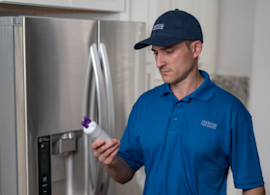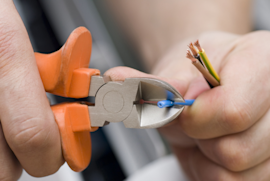Freezer common questions


These common questions about freezers are the ones our experts hear the most often from our customers. You might also find the help you need by checking the common symptoms and solutions for freezers. When you’re ready to make a repair, search your model number to find replacement parts. Sears PartsDirect has the part you need, no matter where you bought your freezer.
What's the difference between an upright and chest freezer?
Most upright freezers are self-defrosting while most chest freezers require manual defrosting. Upright freezers provide easier access to stored food because they have more shelves and baskets. Chest freezers are available in smaller sizes that take up less space. Chest freezers require bending, reaching and moving frozen foods to find what you're looking for. However, chest freezers can accommodate odd-shaped, long or large items that might be difficult to store in an upright freezer.
How often should I defrost my freezer?
Defrost your freezer every 6 to 12 months or when the frost inside the freezer is more than 1/2-inch thick. Frost-free freezers don’t need to be manually defrosted.
How do I defrost my freezer?
To defrost your freezer, unplug the freezer and store the contents someplace cold. Prop the lid or door open to allow warm air to melt the frost. Place a container under the defrost drain to catch the water from the melting frost.
You can speed up the defrost process by using a hair blower dryer to blow hot air on the frost.
Wipe the inside of the freezer clean once it’s defrosted. Return the items to the freezer and plug it in.
What can I use to clean the inside of my freezer?
To clean the inside of your freezer, follow these steps:
Mix 2 tablespoons of baking soda into 1 quart of warm water.
Unplug the freezer.
Use a cloth to wipe the inside walls with the solution.
Rinse by wiping the inside walls of the freezer with plain water.
Dry the inside surfaces of the freezer with a towel.
Plug the freezer back in.
What can I use to clean the outside of my freezer?
Wash the outside of the freezer with a washcloth dipped in warm, soapy water (use stainless-steel cleaner on a stainless-steel freezer). To clean difficult stains, use a non-abrasive kitchen cleanser such as Bon Ami or Bar Keepers Friend, after testing the kitchen cleanser on an inconspicuous area.
Rinse the cabinet thoroughly by wiping it with plain water.
Dry the cabinet with a towel.
What should I do with my freezer during a power failure?
During a power outage, keep the freezer door closed. When a power failure occurs, foods stay frozen for about 24 hours if the freezer stays closed. If the power failure continues, pack 7 or 8 pounds of dry ice into the freezer every 24 hours to keep foods frozen. Always wear protective gloves when handling dry ice.
How can I save energy using my freezer?
Position the freezer in the coolest area of the room, away from heat-producing appliances and out of direct sunlight. Leave at least 1-inch of clearance around all sides of the cabinet. Keep the temperature setting at zero degrees (not -5 degrees). Let hot foods cool to room temperature before placing them in the freezer.
How can I reduce frost buildup in my freezer?
Open the freezer only when necessary and close the soon as possible after removing items. Wrap foods properly and wipe containers dry before placing in the freezer. Organize and label food to reduce the time searching for items.
How do I get rid of smells inside my freezer?
An open box of baking soda helps eliminate most smells. For drastic odors, use commercially available refrigerator deodorizer. It’s 50 times more powerful than baking soda, according to the manufacturer. Keep foods tightly sealed to help prevent odors.
How do I get rust off the outside of my freezer?
To remove rust from a freezer, use non-abrasive kitchen cleansers such as Bon Ami or Bar Keepers Friend. Test the kitchen cleanser on an inconspicuous area before using it on the entire freezer.
To eliminate severe rust, sand the rust off of the cabinet using sand paper and then paint the area with appliance touch-up paint.
How do I add refrigerant to my freezer?
Adding refrigerant to your freezer is not a do-it-yourself repair. Recovery and recharge of air conditioner refrigerant is tightly regulated by the Environmental Protection Agency (EPA). Only an EPA-licensed technician should recover, repair and recharge a sealed refrigerant system in your freezer.
How do I get my Kenmore freezer out of Demo mode?
On Kenmore freezers with electronic controls, the control lets you set a temperature but then won't cool when it's in Demo mode. Press and hold the Up arrow and Set button for 10 seconds to exit the Demo mode. On models without the Set button, press the Down arrow until the temperature setting reaches minus-10 degrees. Within 2 seconds, press the Down arrow 2 more times to exit the Demo mode. Set the control to your desired temperature and the freezer will cool normally.
How do I get my GE freezer out of Demo mode?
A decimal point appears after the temperature setting when the freezer is in the Demo mode. Also, the control lets you set a temperature, but the freezer doesn't cool. To exit the Demo mode, unplug the freezer. Have a helper press and hold the Colder and Warmer keys while you plug in the freezer. Release the keys after restoring power. Set the control to your desired temperature and the freezer will cool normally.
Most common symptoms to help you fix your freestanding freezers
Choose a symptom to see related freezer repairs.
Main causes: burned out light bulb, bad door or lid switch, faulty LED light board, wiring failure, control system failu…
Main causes: lack of power, bad compressor, refrigerant leak, bad thermistor, defrost system failure, dirty condenser co…
Main causes: compressor failure, no refrigerant, faulty sensor, control failure, broken defrost heater, bad defrost bi-m…
Main causes: damaged door or lid gasket, cracked cabinet liner, bad defrost bi-metal thermostat, broken defrost heater, …
Main causes: excessive frost, bad defrost heater, bad defrost bi-metal, control system failure, low refrigerant charge, …
Main causes: dirty condenser coils, condenser fan failure, dirty bottom front grill, leaky door or lid gasket…
Main causes: lack of power, control system failure, broken compressor start relay, locked up compressor, compressor moto…
Main causes: leaky door or lid gasket, broken defrost heater, bad defrost bi-metal thermostat, defrost control failure, …
Most common repair guides to help fix your freestanding freezers
Effective articles & videos to help repair your freestanding freezers
Use the advice and tips in these articles and videos to get the most out of your freezer.

Learn about all the convenient features on our Sears PartsDirect website that make your parts purchases easier.…

Get answers to frequently asked questions about Sears and Sears PartsDirect.…

Learn how to repair broken, frayed or damaged wires in your appliances.…
